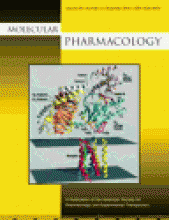Abstract
IL-1β induced an increase in ICAM-1 expression in human A549 epithelial cells and immunofluorescence staining confirmed this result. Tyrosine kinase inhibitors (genistein or tyrphostin 23) or phosphatidylcholine-specific phospholipase C inhibitor (D609) attenuated IL-1β-induced ICAM-1 expression. IL-1β produced an increase in PKC activity and this effect was abolished by D609. PKC inhibitors (staurosporine, Ro 31-8220, calphostin C, or Go 6976) also inhibited IL-1β-induced response. TPA, a PKC activator, stimulated ICAM-1 expression as well, this effect being inhibited by tyrosine kinase inhibitors. Treatment of cells with IL-1β resulted in stimulation of p44/42 MAPK, p38, and JNK. However, neither the mitogen activated protein kinase kinase inhibitor PD 98059 nor the p38 inhibitor SB 203580 affected IL-1β-induced ICAM-1 expression. NF-κB DNA-protein binding and ICAM-1 promoter activity were enhanced by IL-1β and these effects were inhibited by tyrphostin 23, but not by PD 98059 or SB 203580. TPA also stimulated NF-κB DNA-protein binding and ICAM-1 promoter activity as well, these effects being inhibited by tyrosine kinase inhibitors. Dominant-negative PKCα, NIK, or IKK2, but not IKK1 mutant, inhibited IL-1β- or TPA-induced ICAM-1 promoter activity. IKK activity was stimulated by either IL-1β or TPA, and these effects were inhibited by Ro 31-8220 or tyrphostin 23. Taken together, IL-1β activates phosphatidylcholine-specific phospholipase C and induces activation of PKCα and protein tyrosine kinase, resulting in the stimulation of NIK, IKK2, and NF-κB in the ICAM-1 promoter, then initiation of ICAM-1 expression. However, activation of p44/42 MAPK, p38, and JNK is not involved.
Footnotes
- Received March 24, 2000.
- Accepted September 8, 2000.
-
Send reprint requests to: Dr. Ching-Chow Chen, Institute of Pharmacology, College of Medicine, National Taiwan University, No. 1, Jen-Ai Road, 1st Section, Taipei 10018, Taiwan. E-mail:ccchen{at}ha.mc.ntu.edu.tw
-
This work was supported by a research grant from the National Science Council of Taiwan.
- The American Society for Pharmacology and Experimental Therapeutics
MolPharm articles become freely available 12 months after publication, and remain freely available for 5 years.Non-open access articles that fall outside this five year window are available only to institutional subscribers and current ASPET members, or through the article purchase feature at the bottom of the page.
|






